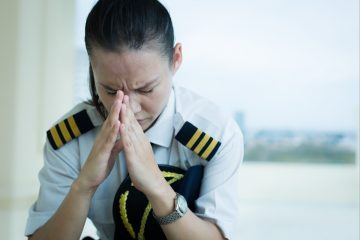
Traumatised pilots can’t seek counselling post-pandemic without risk of being grounded
— March 19, 2023- ‘In Hong Kong, they put cable ties on the bus [door handles] to and from the hotel … Everyone was borderline depressed,’ says a pilot based in the city

Hong Kong is emerging from the Covid-19 pandemic and there is a rush to welcome visitors – including through the Hello, Hong Kong campaign. But take a moment to consider those men and women at the front of the planes who operated in pressure-cooker conditions for three years.Pilots’ mental health has suffered a severe blow. Many would benefit from professional support, but they are reluctant to seek help for fear of losing their jobs.
“If you are a pilot and getting mental help, when the word gets out you could be grounded. It is a huge safety issue which no one talks about,” says John (not his real name), who works for a Hong Kong-based airline and spoke on condition of anonymity.
Pilots worked in what was called a “closed loop” system, being shuttled between airports and hotels for six weeks at a time and tested and monitored throughout.
“In Hong Kong, they put cable ties on the bus [door handles] to and from the hotel. We were treated like animals, everyone was borderline depressed. Going to work with all this in your head, it made the flying environment unsafe,” says John.When Hong Kong’s fifth Covid-19 wave hit last year, and the finger of blame was pointed at flight crew, John felt deflated. For two years he’d been flying urgent vaccines, medical supplies and food into Hong Kong but, far from being recognised as a frontline worker, he and his colleagues were vilified in the media.
A week after the story broke about two Cathay Pacific flight attendants breaching quarantine rules, he called a taxi to go to work; when the cab driver saw him, he refused to pick him up. John got on a bus and sat at the back, and when fellow passengers saw his uniform they moved to the front.
“For the first time in my career [I was] ashamed to wear my uniform,” he says.He hadn’t seen his wife and family for over a year and didn’t know when he’d be able to see them. Combined with the negative public scrutiny and pressure to adhere to shifting regulations, he felt crushed.
“It messes with you mentally, you keep second-guessing yourself, [asking] ‘Have I done something wrong?’ My entire life was focused on meeting the restrictions.
“I can honestly tell you none of us were 100 per cent focused when flying these planes, we were focused on when we would see our families and when this would end,” he says.
Dr Judith Blaine, a research associate at Hong Kong University, questions whether going into mandatory quarantine on a continuous basis constitutes “rest”. We need the opportunity for social interaction and meeting loved ones to feel rejuvenated, she says.
“The long irregular working hours, the reduced rest and the concerns about your own family – if that’s uppermost on your mind how can you concentrate on doing the job you are meant to be doing?” says Blaine.
She says that pilots flying were working on the front line but were not given the recognition of frontline workers.
“In the UK, everyone clapped for the NHS, but no one clapped for the pilots. They brought in vaccines and supplies, brought people home and loved ones together, at the risk of their own lives. I’m not sure they were proactively supported,” says Blaine, who published the first scientific paper on the impact of the world’s longest mandatory quarantine in 2021.Far from being supported, John says he and his colleagues felt worn down, their mental health in tatters. Some of his colleagues left Hong Kong, one of his friends was retrenched and took his own life, but John decided to stay.
“ Honestly, I still feel the effects of it. I feel I’m not the same person I used to be. I don’t go out much, don’t meet people much, I stay at home in my safe place and avoid crowded places,” he says.
John would benefit from mental health support but is wary of putting his hand up. Although he says his airline offers support, it’s a double-edged sword because it could mean losing his job.
“If you talk to your manager, he will say, ‘Why not take six months of unpaid leave?’ I couldn’t afford to do that,” he says.
Blaine says that if pilots report seeing a psychologist, some will lose their medical certification, so they do not seek treatment.
She believes it is essential for pilots to have access to mental health support with no questions asked and no mark left on their record.
“Obviously if their mental health professional feels they are at risk to themselves and others then they are duty bound to report them. But a pilot going through post-Covid stresses should have access to mental support without it compromising their medical certification,” says Blaine.
At the beginning of the pandemic, John says he and his colleagues accepted the regulations and were happy to do their part to help the government. The policy implementation could have been done in a more humane and respectful way, he says.
Rather than being forced to wear a wrist tag and reporting their every move, they could have been depended on to follow the rules.
“I felt there needs to be more trust [in] us. In this industry, we are responsible, our job depends on adhering to policy and following procedures. More than ever right now, [aviation] companies and the government should be doing an analysis of what should have been done better,” John says.
We might just be seeing the tip of the iceberg in terms of pilots’ mental health concerns as we move out of the pandemic.
“They [pilots] haven’t been given the opportunity to process. When you’ve been hard at the coalface and turn your face away and consider what you’ve been through, it’s then you realise quite how exhausted you are and the mental effects of it are felt,” Blaine says.
Blaine would like to see a review of the impact of regulations on mental health in Hong Kong. She points to the New Zealand National Ethics Advisory Committee’s ethical framework, “Getting Through Together: Ethical Values for a Pandemic”, published in 2007, after the severe acute respiratory syndrome (Sars) epidemic from late 2002 to 2004.
It identified five factors: inclusiveness, openness and transparency, reasonableness, responsiveness and accountability.
“That’s what we need to look at to mitigate negative mental health consequences in future pandemics and times of uncertainty. That, and ensuring everyone has access to affordable mental healthcare,” she says.
Original Link: SCMP









